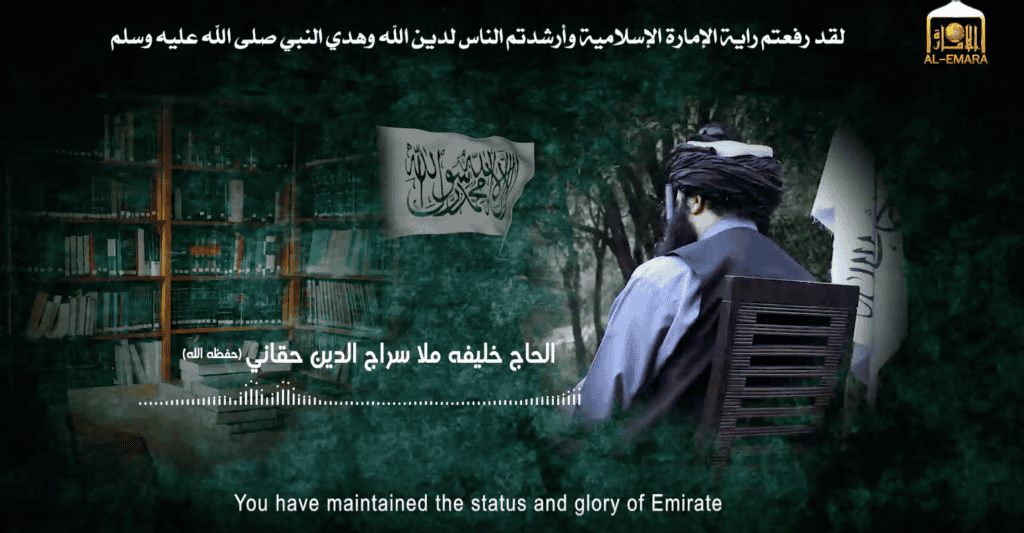
On June 24, the Taliban’s Voice of Jihad website released another message from Sirajuddin Haqqani, a close ally of al Qaeda who serves as the deputy emir of the Islamic Emirate of Afghanistan. Haqqani has repeatedly provided guidance to the group’s fighters, governors and judges throughout their latest offensive in Afghanistan. His latest message is addressed to the Taliban “military officials” overseeing the jihadists’ “continuous series of conquests.”
Haqqani knows that the jihadists can be unruly and prone to violent excesses. So, he advises the Taliban’s “district and provincial governors” to “pay attention to the instructions of” of the group’s leadership, namely the Amir ul-Momineen (“Emir of the Faithful”) Haibatullah Akhundzada and the Taliban’s military commission.
This is a “testing period” for the jihadists, Haqqani explains, as the campaign is evolving from a “military and jihadi” one into a “civilian situation.” He refers to the Taliban’s nascent government as a “system” and informs the group’s rank and file that they should “keep in mind the military, defense and civilian plans for the areas where Mujahideen enter.”
With these words, Haqqani means that the Taliban is now moving into a position of authority and governance throughout much of the country. And he wants the jihadists to “[b]ehave well with the general public and pay attention to civilian and official documents and properties in offices, and make sure they are not lost.”
Haqqani likely wants to avoid the pitfalls of bad governance that the jihadists have experienced in several regions, including parts of Africa and in the Middle East.
“Good governance is the need of the hour and must be taken into account by our colleagues,” Haqqani says. He cautions the Taliban’s membership and officials that they shouldn’t “violate the rights of people.” They should rule “in accordance with Shari,” and consult with the “scholars” embedded in the “units,” as they will “carefully monitor the treasury and spoils.”
Haqqani also warns the jihadists not to seize the “belongings” of anyone who “voluntarily joins the Emirate,” as only the “equipment” seized during “times of war” is “considered as spoils.”
Haqqani offers further guidance for dealing with tribal elders and the Afghan officials who refuse to surrender, cautioning against “revenge” and instructing fighters to consult their superiors on such matters.
In a somewhat cryptic passage, Haqqani says the “political process that has been continuing on the side for the past 14 months has been very meaningful.” This is a reference to deal signed with the Americans in Doha on February 29, 2020. It is certainly “meaningful” for the Taliban, as the group has made no concessions while securing the withdrawal of all American and NATO forces. “In the future,” Haqqani adds, “our comrades must also tread carefully with activities that can harm Islamic and national values.”
Sirajuddin Haqqani is still a U.S. and U.N.-designated terrorist. But he doesn’t speak like a wanted man. Instead, his messages read like those that would be issued by the head of a nation. In this case, that nation is the Taliban’s Islamic Emirate of Afghanistan.
The Taliban continues to produce occasional messages from its overall emir, Haibatullah Akhundzada. But in recent months, the more substantive public marching orders have come from Haqqani.
For example, in March, Haqqani addressed a “great assembly of mujahideen,” congratulating them on their battlefield successes. Much of his talk was clearly intended to prepare the jihadists for the Taliban’s transition from an insurgency to a government. The same theme is repeated in his most recent message.
Then, in April, Haqqani addressed “all the religious scholars and teachers,” explaining why the Taliban’s courts are a core part of the Islamic emirate he and his men are building in Afghanistan.
Meanwhile, American officials continue to operate under the notion that it is possible the Taliban will eventually agree to a political compromise with Kabul.
“We are looking very carefully at the security on the ground in Afghanistan and we’re also looking very hard at whether the Taliban is, at all, serious about a peaceful resolution of the conflict,” Secretary of State Anthony Blinken told reporters on Friday (June 25).
Secretary Blinken made this remark after the Taliban captured dozens of districts in recent weeks. Haqqani’s message, as well as a stream of other messages released by the Taliban, make it clear that the group is preparing to rule over the newly seized territory as part of its Islamic Emirate.







